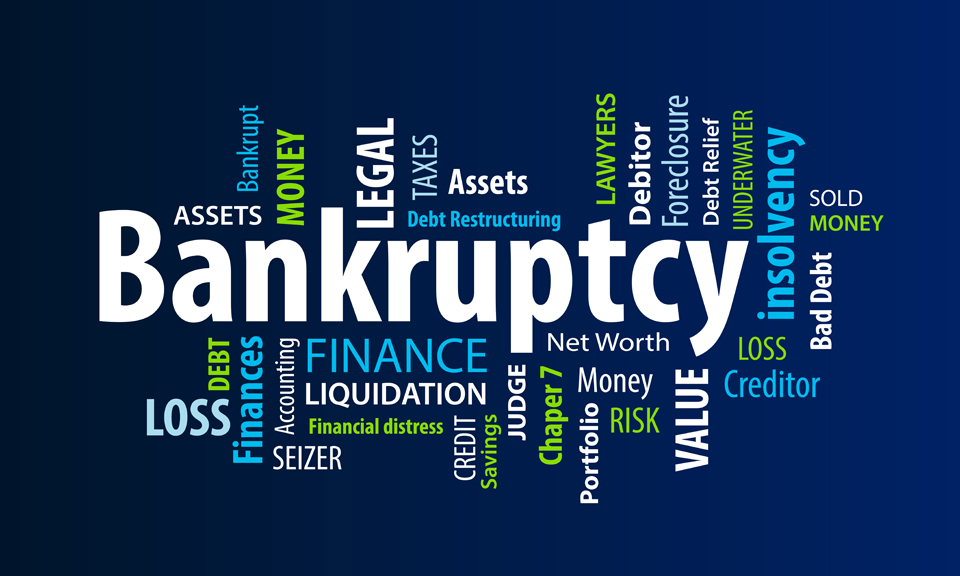
United States Bankruptcy Court
The United States Constitution grants Congress the authority to enact laws “on the subject of Bankruptcies.” With this authority, Congress passed the Bankruptcy Code, the federal law that uniformly governs all bankruptcy cases.
Each judicial district has a separate bankruptcy court, which operates under the Federal Rules of Bankruptcy Procedure.
The bankruptcy judge, appointed for a 14-year term, has the decision-making authority over federal bankruptcy cases. Most of the procedures and day-to-day work in a case, however, are handled by a court-appointed trustee.
Bankruptcy
Life has many unexpected turns and twists. Sometimes, events like a job loss or illness create a situation where bills become unmanageable. Bankruptcy provides relief to the debtor by eliminating or “discharging” many types of qualified debt. This includes credit card balances, personal loans, overdue utility bills, and more. Bankruptcy gives the filer a fresh financial start.
For individual debtors, the most common types of bankruptcy filings are Chapter 7 and Chapter 13. These are named after the chapter number of the Bankruptcy Code.
Chapter 7
Individual debtors often choose to file for Chapter 7 bankruptcy because it is relatively quick. The debtor is not required to repay creditors.
Chapter 7 and Chapter 13 both stop harassment from debt collectors and ends creditor lawsuits, wage garnishments, and other collection efforts.
Chapter 13
Those with higher income, who might earn too much to qualify for Chapter 7, may choose to file for Chapter 13 bankruptcy. In this case, the debtor has to repay some of the debt to creditors. However, it allows the individual to keep some assets like a home or car.
Bankruptcy Court Proceedings
The proceedings revolving around bankruptcy cases are quite complex. That is why there are bankruptcy attorneys that specialize only in this field. Below is a brief overview of the procedure.
On the other hand, you might want to read our article BCG Attorney Search Law Firm News
Chapter 7
Filing for Chapter 7 bankruptcy begins with a petition to the court. It includes the debtor’s property, information about recent monetary and property transactions, current income, and monthly living expenses. The petition also describes the property the law allows the debtor to keep – usually things like equity in the home, household furnishings, a car, and any tools needed for work.
The filing implements an automatic stay. This immediately halts creditors from trying to collect a debt from the petitioner. Wage garnishment, home foreclosures, and cutting off utility services are not allowed. The bankruptcy trustee enforces these measures.
The trustee also reviews the petition, supporting documentation, recent financial transactions that could be revoked, and any non-exempt property sold to satisfy creditors. Non-exempt property can include second homes, a valuable art collection, jewelry, and other items not necessary to maintain a living. Usually, with Chapter 7 cases, little is found to sell.
Shortly after filing for bankruptcy, there is a creditors’ meeting. The petitioner and trustee attend this meeting. Creditors may come as well, but they rarely do. Under oath, the debtor answers any questions the trustee has about the bankruptcy and documentation filed. In most Chapter 7 bankruptcies, this is the debtor’s sole visit to the courthouse. After the creditors’ meeting, if there is any non-exempt property, the debtor may be required to surrender the property to the trustee or provide them with the cash equivalence.
The result of this bankruptcy process is that most of the individual’s debts are discharged. There may be some exceptions, like child support debts, tax obligations, or student loans. The individual is given a second chance to live a viable, financially responsible life.
Chapter 13
The procedure under Chapter 13 is similar to that of Chapter 7. The main difference is that in Chapter 13 bankruptcy, the debtor must pay back some of their debt. Many Chapter 13 bankruptcy proceedings revolve around the management and execution of this repayment plan.
Creditor Lawsuits
During bankruptcy proceedings, a creditor may disagree with the trustee on an issue. Perhaps the creditor opposes a finding that a particular debt is dischargeable, or they do not like a provision of the repayment plan. In this case, the matter is decided before the bankruptcy court.
How does a Bankruptcy Attorney help in Bankruptcy Proceedings?
The bankruptcy process is complicated. A bankruptcy attorney is needed to help guide the debtor through the procedure. There are many responsibilities the bankruptcy attorney has in this area of law.
Discuss Options
The bankruptcy attorney provides the client with competent advice. It begins with a discussion of whether bankruptcy is a viable option. If so, then the advice is provided on whether Chapter 7 or Chapter 13 is appropriate. The bankruptcy attorney should review the client’s financial history, current financial status, and assets to see any particular risks associated with the client’s circumstances.
Preparation and Filing of Paperwork
Filing for bankruptcy is complicated. The legal practitioner will likely use specialized software to help prepare the petition and associated forms. If the court or trustee requires any additional information or forms, the bankruptcy attorney should submit those at well.
The timely submittal of legal paperwork is critical. Failure to do so can result in delays, dismissal of the case, or other consequences.
Representation at Hearings
The bankruptcy attorneys should attend the creditors’ meeting with the client and any other hearings necessary. They will also represent the client with any motions or objections filed by the client, creditors, or trustee.
Contested Matters
Contested matters are issues that arise during the bankruptcy proceedings. These include lifting an automatic stay or modify a repayment plan. The bankruptcy attorneys represent the debtor in these matters before the court.
Bankruptcy Litigation
While most bankruptcy proceedings go reasonably smoothly, with contested matters being handled by the court along the way, a dissatisfied creditor will occasionally file a creditor lawsuit. If this occurs, the bankruptcy attorneys represent the debtor in this litigation, formally called an adversary proceeding. Issues raised in adversary proceedings include determining the ability to discharge a particular debt or seeking an injunction to stop an action the moving party disagrees with.
An adversary proceeding is conducted similarly to any other civil lawsuit.
Draft Pleadings and Initial Motions
First, the creditor files a complaint and serves the client with a summons; then, the bankruptcy attorney files an answer to the complaint.
Preliminary Pretrial Conference
After pleadings have been filed and served, the court schedules a preliminary pretrial conference. At this conference, the parties discuss various aspects of the adversary proceeding with the bankruptcy judge. These include any issues raised by the pleadings, anticipated or pending motions, discovery issues, and the possibility of settlement, including options for mediation and arbitration.
The bankruptcy attorneys will attend the preliminary pretrial conference.
Discovery Process
The bankruptcy court has its own procedures for discovery. Still, they are similar to those provisions in the Federal Rules of Civil Procedure.
Discovery is the exchange of relevant information between the parties. The bankruptcy attorney will use interrogatories (written questions) and depositions (oral questions), and requests to produce documents.
All these discovery mechanisms help the bankruptcy attorney gather needed evidence for the adversary proceeding.
Trial
If all settlement options have been exhausted, then the adversary proceeding goes to trial. The procedures here are similar to everyday civil problems. The client’s bankruptcy attorney and the creditor’s legal practitioner make opening statements. They call witnesses and present exhibits. Finally, each party’s attorney will make their closing argument.
Appeals
Adversary proceeding trial decisions may be appealed. Grounds for this include mistakes by the bankruptcy court or the improper admittance or suppression of evidence.
If the appeal is granted, bankruptcy attorneys will prepare briefs and orally present their case at oral argument.
How To Become A Bankruptcy Law Attorney
To become a bankruptcy attorney, you will need a bachelor's degree and to be enrolled in law school. The degree you will earn is a Juris Doctorate (J.D. ), which takes two to four years to complete.
Anyone who is considering a career as a bankruptcy law attorney should realize that admission to prestigious law schools in the United States is competitive. The Law School Admission Test (LSAT) and completing your application will take some time at a minimum.
As a law student, you will likely need to take courses like legal writing, constitutional law, or property law during your first year in law school. After you complete your core modules, you will also have the opportunity to explore a specialty area, such as bankruptcy.
Among the topics covered are income taxation, creditors' rights, negotiations, intellectual property, and other bankruptcy-specific topics. During law school, many students have the opportunity to participate in moot trials and externships to gain practical experience.
Once you have obtained your law degree, you will need to pass the bar exam to become licensed to practice law in your state.
Essential Skills for a Bankruptcy Attorney
The skills you need to be an effective bankruptcy attorney are numerous. Having these abilities will help you litigate cases successfully, and you will be able to work well with clients and associates. The skills include:
- Interpersonal skills
- Meticulous attention to detail
- Logic and reasoning
- Effective decision-making
- The ability to analyze vast amounts of data
- Adept negotiation
- Persuasiveness
Bankruptcy Attorney Salary and Job Outlook
Unemployment, layoffs, salary reductions, and a rising cost of living have all contributed to the debt crisis. Due to this trend, many people have been unable to repay their debts and have declared bankruptcy instead. As a result, bankruptcy attorneys are in greater demand.
According to the U.S. Bureau of Labor Statistics (BLS), bankruptcy attorneys' employment increased by about 10 percent between 2012 and 2018. A bankruptcy attorney earns an average of $71,888 per year, according to ZipRecruiter.
However, salaries vary considerably according to a variety of factors, including skills, experience, and demographics for a company and its clients.
If You Need a Bankruptcy Law Attorney, When Should You Hire One?
Bankruptcy can be a confusing and complicated process. To be successful, individuals and businesses must carefully review it. When filing for bankruptcy, the first thing you need to do is consult with an attorney.
You can determine if you qualify for bankruptcy assistance by consulting a bankruptcy attorney. Upon your approval, the attorney will prepare the necessary documents and direct you in the process. You will need documentation to prove your debts and validity, as well as your income and justification for not being able to pay.
After the attorney has represented you, the judge will also be present to hear your case. To help you understand your options, they will explain different kinds of bankruptcy.
Conclusion
Bankruptcy is a complicated process, and those interested in filing for it needs the services of an attorney who specialized in the process – a bankruptcy attorney.
See Also:
- The Benefits Of Practicing Bankruptcy Law
- Bankruptcy Attorney Job Description
- Bankruptcy Law Firms
- Adopting Bankruptcy As Your Chosen Practice Area
About Harrison Barnes
Harrison Barnes is a prominent figure in the legal placement industry, known for his expertise in attorney placements and his extensive knowledge of the legal profession.
With over 25 years of experience, he has established himself as a leading voice in the field and has helped thousands of lawyers and law students find their ideal career paths.
Barnes is a former federal law clerk and associate at Quinn Emanuel and a graduate of the University of Chicago College and the University of Virginia Law School. He was a Rhodes Scholar Finalist at the University of Chicago and a member of the University of Virginia Law Review. Early in his legal career, he enrolled in Stanford Business School but dropped out because he missed legal recruiting too much.
Barnes' approach to the legal industry is rooted in his commitment to helping lawyers achieve their full potential. He believes that the key to success in the legal profession is to be proactive, persistent, and disciplined in one's approach to work and life. He encourages lawyers to take ownership of their careers and to focus on developing their skills and expertise in a way that aligns with their passions and interests.
One of how Barnes provides support to lawyers is through his writing. On his blog, HarrisonBarnes.com, and BCGSearch.com, he regularly shares his insights and advice on a range of topics related to the legal profession. Through his writing, he aims to empower lawyers to control their careers and make informed decisions about their professional development.
One of Barnes's fundamental philosophies in his writing is the importance of networking. He believes that networking is a critical component of career success and that it is essential for lawyers to establish relationships with others in their field. He encourages lawyers to attend events, join organizations, and connect with others in the legal community to build their professional networks.
Another central theme in Barnes' writing is the importance of personal and professional development. He believes that lawyers should continuously strive to improve themselves and develop their skills to succeed in their careers. He encourages lawyers to pursue ongoing education and training actively, read widely, and seek new opportunities for growth and development.
In addition to his work in the legal industry, Barnes is also a fitness and lifestyle enthusiast. He sees fitness and wellness as integral to his personal and professional development and encourages others to adopt a similar mindset. He starts his day at 4:00 am and dedicates several daily hours to running, weightlifting, and pursuing spiritual disciplines.
Finally, Barnes is a strong advocate for community service and giving back. He volunteers for the University of Chicago, where he is the former area chair of Los Angeles for the University of Chicago Admissions Office. He also serves as the President of the Young Presidents Organization's Century City Los Angeles Chapter, where he works to support and connect young business leaders.
In conclusion, Harrison Barnes is a visionary legal industry leader committed to helping lawyers achieve their full potential. Through his work at BCG Attorney Search, writing, and community involvement, he empowers lawyers to take control of their careers, develop their skills continuously, and lead fulfilling and successful lives. His philosophy of being proactive, persistent, and disciplined, combined with his focus on personal and professional development, makes him a valuable resource for anyone looking to succeed in the legal profession.
About BCG Attorney Search
BCG Attorney Search matches attorneys and law firms with unparalleled expertise and drive, while achieving results. Known globally for its success in locating and placing attorneys in law firms of all sizes, BCG Attorney Search has placed thousands of attorneys in law firms in thousands of different law firms around the country. Unlike other legal placement firms, BCG Attorney Search brings massive resources of over 150 employees to its placement efforts locating positions and opportunities its competitors simply cannot. Every legal recruiter at BCG Attorney Search is a former successful attorney who attended a top law school, worked in top law firms and brought massive drive and commitment to their work. BCG Attorney Search legal recruiters take your legal career seriously and understand attorneys. For more information, please visit www.BCGSearch.com.
Harrison Barnes does a weekly free webinar with live Q&A for attorneys and law students each Wednesday at 10:00 am PST. You can attend anonymously and ask questions about your career, this article, or any other legal career-related topics. You can sign up for the weekly webinar here: Register on Zoom
Harrison also does a weekly free webinar with live Q&A for law firms, companies, and others who hire attorneys each Wednesday at 10:00 am PST. You can sign up for the weekly webinar here: Register on Zoom
You can browse a list of past webinars here: Webinar Replays
You can also listen to Harrison Barnes Podcasts here: Attorney Career Advice Podcasts
You can also read Harrison Barnes' articles and books here: Harrison's Perspectives
Harrison Barnes is the legal profession's mentor and may be the only person in your legal career who will tell you why you are not reaching your full potential and what you really need to do to grow as an attorney--regardless of how much it hurts. If you prefer truth to stagnation, growth to comfort, and actionable ideas instead of fluffy concepts, you and Harrison will get along just fine. If, however, you want to stay where you are, talk about your past successes, and feel comfortable, Harrison is not for you.
Truly great mentors are like parents, doctors, therapists, spiritual figures, and others because in order to help you they need to expose you to pain and expose your weaknesses. But suppose you act on the advice and pain created by a mentor. In that case, you will become better: a better attorney, better employees, a better boss, know where you are going, and appreciate where you have been--you will hopefully also become a happier and better person. As you learn from Harrison, he hopes he will become your mentor.
To read more career and life advice articles visit Harrison's personal blog.





